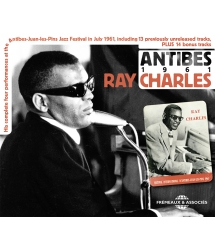- Notre Catalogue
- Philosophie
- Philosophes du XXème siècle et d'aujourd'hui
- Histoire de la philosophie (PUF)
- Contre-Histoire et Brève encyclopédie par Michel Onfray
- L'œuvre philosophique expliquée par Luc Ferry
- La pensée antique
- Les penseurs d'hier vus par les philosophes d'aujourd'hui
- Textes philosophiques historiques interprétés par de grands comédiens
- Histoire
- Livres
- Sciences Humaines
- Paroles historiques
- Livres audio & Littérature
- Notre Catalogue
- Jazz
- Blues - R'n'B - Soul - Gospel
- Rock - Country - Cajun
- Chanson française
- Musiques du monde
- Afrique
- France
- Québec / Canada
- Hawaï
- Antilles
- Caraïbes
- Cuba & Afro-cubain
- Mexique
- Amérique du Sud
- Tango
- Brésil
- Tzigane / Gypsy
- Fado / Portugal
- Flamenco / Espagne
- Yiddish / Israël
- Chine
- Tibet / Népal
- Asie
- Océan indien / Madagascar
- Japon
- Indonésie
- Océanie
- Inde
- Bangladesh
- URSS / Chants communistes
- Musiques du monde / Divers
- Musique classique
- Compositeurs - Musiques de film - B.O.
- Sons de la nature
- Notre Catalogue
- Jeunesse
- Philosophie
- Nouveautés
- Comment commander ?
- Recevoir le catalogue
- Manifeste
- Dictionnaire
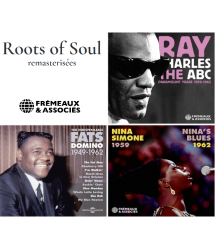

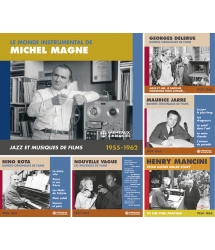








- Notre Catalogue
- Philosophie
- Philosophes du XXème siècle et d'aujourd'hui
- Histoire de la philosophie (PUF)
- Contre-Histoire et Brève encyclopédie par Michel Onfray
- L'œuvre philosophique expliquée par Luc Ferry
- La pensée antique
- Les penseurs d'hier vus par les philosophes d'aujourd'hui
- Textes philosophiques historiques interprétés par de grands comédiens
- Histoire
- Livres
- Sciences Humaines
- Paroles historiques
- Livres audio & Littérature
- Notre Catalogue
- Jazz
- Blues - R'n'B - Soul - Gospel
- Rock - Country - Cajun
- Chanson française
- Musiques du monde
- Afrique
- France
- Québec / Canada
- Hawaï
- Antilles
- Caraïbes
- Cuba & Afro-cubain
- Mexique
- Amérique du Sud
- Tango
- Brésil
- Tzigane / Gypsy
- Fado / Portugal
- Flamenco / Espagne
- Yiddish / Israël
- Chine
- Tibet / Népal
- Asie
- Océan indien / Madagascar
- Japon
- Indonésie
- Océanie
- Inde
- Bangladesh
- URSS / Chants communistes
- Musiques du monde / Divers
- Musique classique
- Compositeurs - Musiques de film - B.O.
- Sons de la nature
- Notre Catalogue
- Jeunesse
- Philosophie
- Nouveautés
- Comment commander ?
- Recevoir le catalogue
- Manifeste
- Dictionnaire
INTEGRALE 1956-1962
ARETHA FRANKLIN
Ref.: FA5735
Direction Artistique : BRUNO BLUM
Label : Frémeaux & Associés
Durée totale de l'œuvre : 2 heures 19 minutes
Nbre. CD : 2
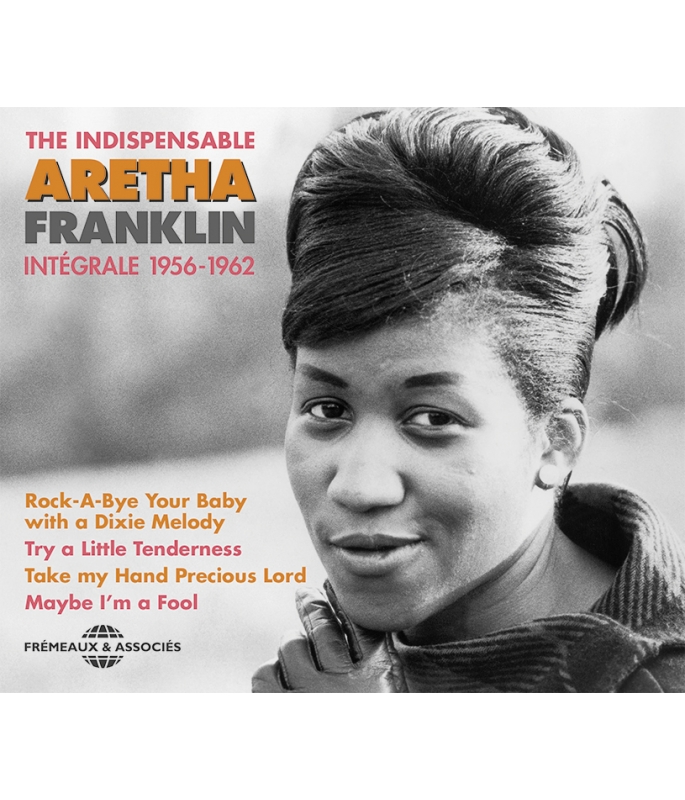
INTEGRALE 1956-1962
Reine de la Soul, Aretha Franklin fut sans doute plus encore : la Reine des Chanteuses Américaines, un titre très disputé auquel son impressionnante discographie peut aisément prétendre. Ce double album contient les six premières années de ses enregistrements où, de vedette surdouée du gospel à quatorze ans, elle devint l’une des plus extraordinaires vocalistes de l’histoire avec l’intensité des renversants « Today I Sing the Blues » ou « Maybe I’m a Fool ». Bruno Blum raconte ici son histoire.
Patrick FRÉMEAUX
« Aretha a contribué à définir l’expérience américaine. Dans sa voix on a pu ressentir notre histoire, toute notre histoire et dans toutes ses nuances — notre puissance et notre douleur, notre noirceur et notre lumière, notre quête pour la rédemption et notre respect durement gagné. Que la Reine de la Soul repose en paix éternellement. »
Barack OBAMA
Conception collection : Patrick Frémeaux & Claude Colombini
Direction Artistique : Bruno Blum
Direction collection : Augustin Bondoux
Droits : Frémeaux & Associes
Aretha Franklin was the Queen of Soul and probably much more: the Queen of American singers, a much- disputed title her impressive discography can easily claim. This double album includes the first six years of her recordings, going forward from her beginnings as an exceptionally gifted gospel singer aged fourteen. She went on to become one of the most extraordinary vocalists in music history, thanks to the intensity of astounding recordings like “Today I Sing the Blues” or “Maybe I’m a Fool.” Bruno Blum tells her story. Patrick FRÉMEAUX
“Aretha helped define the American experience. In her voice, we could feel our history, all of it and in every shade — our power and our pain, our darkness and our light, our quest for redemption and our hard-won respect. May the Queen of Soul rest in eternal peace.” Barack OBAMA
CD 1 : SONGS OF FAITH : THERE IS A FOUNTAIN FILLED WITH BLOOD • TAKE MY HAND PRECIOUS LORD (PART ONE) • TAKE MY HAND PRECIOUS LORD (PART TWO) • YOU GROW CLOSER • NEVER GROW OLD • THE DAY IS PAST AND GONE • HE WILL WASH YOU WHITE AS SNOW • WHILE THE BLOOD RUNS WARM • YIELD NOT TO TEMPTATION. ARETHA - WITH THE RAY BRYANT COMBO : TODAY I SING THE BLUES • LOVE IS THE ONLY THING • RIGHT NOW • OVER THE RAINBOW • ALL NIGHT LONG • (BLUE) BY MYSELF • SWEET LOVER • WON’T BE LONG • IT AIN’T NECESSARILY SO • WHO NEEDS YOU? • ARE YOU SURE • MAYBE I’M A FOOL. B-SIDES : OPERATION HEARTBREAK • TROUBLE IN MIND. CD 1 : THE ELECTRIFYING ARETHA FRANKLIN : YOU MADE ME LOVE YOU • I TOLD YOU SO • ROCK-A-BYE YOUR BABY WITH A DIXIE MELODY • NOBODY LIKE YOU • EXACTLY LIKE YOU • IT’S SO HEARTBREAKING) • ROUGH LOVER • BLUE HOLIDAY • JUST FOR YOU • THAT LUCKY OLD SUN (JUST ROLLS AROUND HEAVEN ALL DAY) • I SURRENDER DEAR • AC-CENTU-ATE THE POSITIVE. THE TENDER, THE MOVING, THE SWINGING ARETHA FRANKLIN : DON’T CRY, BABY • TRY A LITTLE TENDERNESS • I APOLOGIZE • WITHOUT THE ONE YOU LOVE • LOOK FOR THE SILVER LINING • I’M SITTING ON TOP OF THE WORLD • JUST FOR A THRILL • GOD BLESS THE CHILD • I’M WANDERING • HOW DEEP IS THE OCEAN • I DON’T KNOW YOU ANYMORE • LOVER COME BACK TO ME.
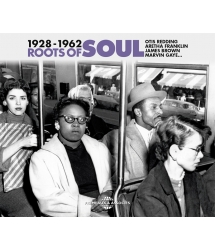
OTIS REDDING • ARETHA FRANKLIN • JAMES BROWN • MARVIN...
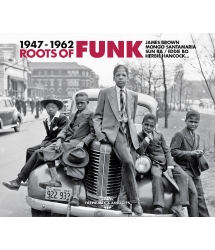
JAMES BROWN • MONGO SANTAMARIA • SUN RA / EDDIE BO •...
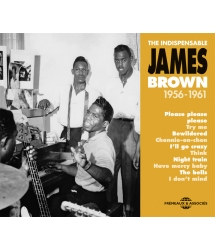
JAMES BROWN
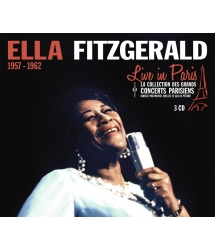
1957-1962





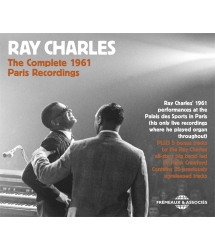

-
PisteTitreArtiste principalAuteurDuréeEnregistré en
-
1There Is a Fountain Filled with BloodAretha FranklinW. Cowper00:04:292018
-
2Take My Hand Precious Lord (Part One)Aretha FranklinThomas A. Dorsey00:03:232018
-
3Take My Hand Precious Lord (Part Two)Aretha FranklinThomas A. Dorsey00:02:532018
-
4You Grow CloserAretha FranklinAretha Franklin00:02:442018
-
5Never Grow OldAretha FranklinInconnu00:02:572018
-
6The Day Is Past and GoneAretha FranklinInconnu00:05:002018
-
7He Will Wash You White as SnowAretha FranklinInconnu00:04:212018
-
8While the Blood Runs WarmAretha FranklinInconnu00:03:072018
-
9Yield Not to TemptationAretha FranklinInconnu00:03:002018
-
10Today I Sing the BluesAretha FranklinReginald Curtis00:02:482018
-
11Love Is the Only ThingAretha FranklinJohn Leslie McFarland00:02:452018
-
12Right NowAretha FranklinJohn Leslie McFarland00:02:242018
-
13Over the RainbowAretha FranklinHarold Arlen00:02:402018
-
14All Night LongAretha FranklinReginald Curtis00:03:072018
-
15(Blue) by MyselfAretha FranklinJohn Leslie McFarland00:02:402018
-
16Sweet LoverAretha FranklinJohn Leslie McFarland00:03:242018
-
17Won't Be LongAretha FranklinJohn Leslie McFarland00:03:222018
-
18It Ain't Necessarily SoAretha FranklinG. Et I. Gershwin00:03:092018
-
19Who Needs YouAretha FranklinBillie Holiday00:02:522018
-
20Are You SureAretha FranklinRobert Reiniger00:02:422018
-
21Maybe I'm a FoolAretha FranklinJohn Leslie McFarland00:03:182018
-
22Operation HeartbreakAretha FranklinAlfred Kasha00:03:012018
-
23Trouble in MindAretha FranklinJones Richard Marigny00:02:142018
-
PisteTitreArtiste principalAuteurDuréeEnregistré en
-
1You Made Me Love YouAretha FranklinJoseph McCarthy00:02:182018
-
2Told You SoAretha FranklinJohn Leslie McFarland00:02:432018
-
3Rock-a-Bye Your Baby with a Dixie MelodyAretha FranklinSam M. Lewis00:02:242018
-
4Nobody Like YouAretha FranklinJames Cleveland00:02:222018
-
5Exactly Like YouAretha FranklinJimmy McHugh00:02:362018
-
6It's so HeartbreakingAretha FranklinJohn Leslie McFarland00:02:402018
-
7Rough LoverAretha FranklinW. Denson00:02:472018
-
8Blue HolidayAretha FranklinJ. Bailey00:02:542018
-
9Just for YouAretha FranklinHaven Gillespie00:02:212018
-
10That Lucky Old Sun (Just Rolls Around Heaven All Day)Aretha FranklinHarry Barris00:03:202018
-
11I Surrender DearAretha FranklinHarold Arlen00:02:462018
-
12Ac-Cent-Tchu-Ate the PositiveAretha FranklinSaul Bernie00:02:182018
-
13Don't Cry BabyAretha FranklinJohn Leslie McFarland00:03:222018
-
14Try a Little TendernessAretha FranklinJames Campbell00:03:162018
-
15I ApologizeAretha FranklinAl Hoffman00:02:542018
-
16Without the One You LoveAretha FranklinAretha Franklin00:02:482018
-
17Look for the Silver LiningAretha FranklinJerome Kern00:03:052018
-
18I'm Sitting on Top of the WorldAretha FranklinRay Henderson00:02:432018
-
19Just for a ThrillAretha FranklinLil Hardin Armstrong00:02:332018
-
20God Bless the ChildAretha FranklinBillie Holiday00:03:032018
-
21I'm WanderingAretha FranklinBerry Gordy Jr00:03:282018
-
22How Deep Is the OceanAretha FranklinIrving Berlin00:02:492018
-
23I Don't Know You AnymoreAretha FranklinGary Geld00:02:502018
-
24Lover Come Back to MeAretha FranklinSigmund Romberg00:02:352018
Areta Franklin FA5735
THE INDISPENSABLE
ARETHA
FRANKLIN
INTÉGRALE 1956-1962
Rock-A-Bye Your Baby
with a Dixie Melody
Try a Little Tenderness
Take my Hand Precious Lord
Maybe I’m a Fool
The Indispensable
Aretha Franklin
1956-1962
par Bruno Blum
Aretha Louise Franklin (25 mars 1942-16 août 2018) est née au 406 Lucy Avenue à Memphis dans le Tennessee, l’un des bastions du Ku Klux Klan et de l’oppression raciale aux États-Unis. Son père Clarence LaVaugh Franklin dit « C.L. » était un pasteur baptiste qui, faute d’un poste permanent, prêchait de façon itinérante dans la région, circulant d’un temple à l’autre. En 1944, comme beaucoup d’Afro-américains souffrant de la pauvreté et du racisme, les Franklin sont partis vers le nord. D’abord déplacée à Buffalo (New York) la famille nombreuse s’est installée à Detroit (Michigan) en 1947. C. L. y a obtenu la charge d’un temple New Bethel Baptist et obtint peu à peu une grande affluence. La mère Barbara Franklin (née Siggers), a quitté son mari infidèle en 1948; elle est retournée à Buffalo avec un des demi-frères d’Aretha, Vaughn. Elle ne revit ses autres enfants qu’à l’occasion des vacances et mourut d’une crise cardiaque le 7 mars 1952. C’est la grand-mère Rachel qui se chargea de l’éducation d’Aretha après le décès de Barbara.
GOSPEL À DETROIT
Mahalia Jackson, la plus célèbre chanteuse de gospel de l’après-guerre, rendait fréquemment visite à Aretha et aidait la famille(1). L’enfant commença à chanter dans le temple de son père à l’âge de dix ans et apprit seule à jouer du piano, à l’oreille. Elle quitta le collège Northern High School à l’âge de treize ans. La ville de Detroit, où vivaient un grand nombre d’Afro-américains venus du sud chercher du travail dans la capitale industrielle de l’automobile, était imprégnée de culture baptiste. Cette religion protestante était depuis plus d’un siècle l’un des grands vecteurs d’organisation, de culture, de libération et de foi du peuple afro-américain. Dans les années 1950 les prêches baptistes (mais aussi méthodistes et surtout pentecôtistes) étaient souvent chargés d’émotion et C.L. Franklin excellait en expression du pathos. Accompagné par son équipe de chant gospel, le révérend était devenu une célébrité du clergé. Il gagnait de grosses sommes avec ses prêches dans tout le pays et Aretha devint vite la chanteuse solo attitrée de l’équipe de son père. Elle commençait ses prestations par «Jesus, Be a Fence Around Me» et le révérend était devenu son manager alors qu’elle n’avait que douze ans. Comme Frankie Lymon avant elle ou Michael Jackson et Dennis Brown plus tard, elle était déjà une enfant-vedette, sans arrêt en tournée. Elle donnait des interprétations puissantes, spontanées, capables d’émouvoir les fidèles aux larmes, en utilisant les techniques d’improvisation que l’on retrouve dans le blues, le jazz comme dans le gospel : ornementations diverses comme les mélismes, appoggiatures, passage brusque de la mélodie à un octave plus haut, utilisation de la septième mineure, etc. Ce langage musical était également utilisé par son père. C.L. Franklin était devenu « la voix à un million de dollars » et le succès parallèle de sa fille lui permit d’obtenir sans difficultés un contrat avec les disques J-V-B de Joe Von Battle (né Joseph Battle), un ancien prêcheur de l’African Methodist Episcopal Church devenu un incontournable disquaire à Detroit. Von Battle avait commencé à enregistrer et sortir des disques de gospel en 1948 (et le blues « Boogie Rambler/No More Doggin’ » de John Lee Hooker). Il avait publié deux disques de prêches du père d’Aretha en 1956 (les deux parties de « Old Ship of Zion » et « I’m Going Through »). Il enregistra neuf titres (qui ouvrent ici le disque 1) de la gamine de quatorze ans à la New Bethel Baptist Church familiale en même temps que son père et sortit début 1957 Never Grow Old avec en face B Grow Closer. Le gospel enregistré connaissait un fort renouveau pendant cette période avec par exemple le succès des excellents Five Blind Boys of Alabama et surtout de Mahalia Jackson et Clara Ward — qui vécut une longue relation affective non officielle avec C.L. Franklin et devint de fait la belle-mère d’Aretha. Jusqu’en 1958 Clara Ward et ses Ward Singers étaient sans arrêt en tournée avec Aretha et son père; elle devint une sorte de modèle pour l’adolescente, qui était aussi très marquée par Dinah Washington. Entre 1956 et 1959 Joe Von Battle a publié au moins soixante-trois disques 78 tours à deux titres de C.L. Franklin, des prêches et chants gospel qu’il ne cessera de rééditer jusqu’en 1966. L’album Spirituals (vers 1958) contenait cinq titres d’Aretha dont Take my Hand Precious Lord, morceau emblématique de Mahalia Jackson et quatre de C.L. (plus deux de la naine Sammie Bryant). Leur spectacle attirait des vedettes comme Jackie Wilson, Sam Cooke et Martin Luther King, avec qui ils partirent en tournée. J-V-B a sorti d’autres documents de ses débuts gospel, tous réunis ici.
BLUES, JAZZ ET VARIETE CHEZ COLUMBIA
C’est la rencontre entre Aretha et Sam Cooke en Californie en 1958 qui donna à la chanteuse l’envie de tenter sa chance dans la musique populaire. Après une carrière de chanteur de gospel à succès avec les Soul Stirrers, Cooke s’était lancé dans la chanson en 1956, et avait atteint le numéro un avec « You Send Me » en 1957, un changement de style controversé, critiqué par les religieux, qui fit sa fortune. Après son anniversaire de dix-huit ans, Aretha déclara son désir de suivre son exemple. Son père lui fit alors enregistrer une maquette de deux titres qui convainquit Berry Gordy. Ce parolier indépendant venait de fonder les disques Tamla-Motown. Au printemps 1960, le révérend Franklin préféra accepter l’offre du légendaire John Hammond (découvreur de Bessie Smith et Billie Holiday, entre autres) chez Columbia. Hammond avait été conseillé par le compositeur Curtis Reginald Lewis, qui plaça deux compositions sur l’album à venir. Différentes chansons ont été proposées à Aretha, dont six signées par John Leslie McFarland. Ce compositeur et arrangeur avait écrit plusieurs morceaux pour Bill Haley et venait d’écrire « Stuck on You », le treizième numéro un d’Elvis Presley, sorti en mars 1960, pile au moment où Hammond montait une équipe pour Aretha. La jeune femme déménagea à New York et entra en studio avec le groupe de Ray Bryant, un pianiste, arrangeur et compositeur venu du gospel. Bryant était le pianiste maison du Blue Note Club dans sa ville de Philadelphie, où il avait notamment accompagné Lester Young, Charlie Parker, Sonny Stitt et Miles Davis; puis il avait joué quatre mois avec Dizzy Gillespie et enregistré avec Miles et Sonny Rollins, Tiny Grimes et Carmen McRae. Installé à New York en 1959, Bryant multiplia les séances de studio, notamment avec Ella Fitzgerald, avant de signer lui aussi avec Columbia, engagé par John Hammond. Ensemble ils créèrent le premier album d’Aretha Franklin, douze titres dépouillés qui comptent parmi les plus grands chefs-d’œuvre de celle qui allait devenir la reine incontestée de la soul, un titan dans l’histoire de la musique états-unienne. Un remarquable premier 45 tours, Today I Sing the Blues/Love Is The Only Thing en octobre 1960 s’est classé dans les dix meilleures ventes R&B. Rarement les sentiments de l’amour avaient été exprimés avec un tel éclat, avec une interprétation d’une telle justesse, d’une telle force. Pourtant malgré des morceaux renversants comme Maybe I’m a Fool et l’excellent titre sur la foi Are You Sure, l’album Aretha: With The Ray Bryant Combo paru le 27 février 1961 n’a pas eu de succès. Aretha n’a plus cessé d’enregistrer ensuite, mais elle ne connut la gloire que six ans plus tard avec les disques Atlantic. Que s’est-il passé ?
THE ELECTRIFYING ARETHA FRANKLIN
Déçu par cet échec commercial, le producteur John Hammond changea son équipe de musiciens et fit appel à l’arrangeur Richard Wess, qui travaillait avec des artistes de variété comme Bobby Darin. Ce chanteur blanc rêvait de chanter du rock à l’exemple d’Elvis Presley mais ce sont des chansons rythmées, sans envergure, qui ont fait son succès grâce à des morceaux bien ficelés par ses arrangeurs, dont Wess. Richard Wess était spécialisé dans la variété : nappes de violons (Just For You, That Lucky Old Sun), interventions de vents dans un style swing suranné, vieux de dix ans au moins (comme sur Ac-Cent-Tchu-Ate the Positive, enregistré avec talent en 1959 par Gene Vincent(2)). The Electrifying Aretha Franklin est sorti une semaine avant l’anniversaire de vingt ans de la chanteuse. Avec le recul, John Hammond a fait une erreur de direction artistique en engageant Wess sur cette production au moment où la musique soul pure commençait à surgir de tous les coins du pays (écouter Roots of Soul 1928-1962 et New Orleans Roots of Soul 1941-1962 dans cette collection). Indiscutablement, la lourdeur et le style des arrangements nuisent aux interprétations enflammées d’Aretha, qui se suffisaient à elles-mêmes, comme on peut le vérifier sur son brillant premier album studio, plus sobre, gravé un an plus tôt (disque 1). Néanmoins, le génie de la jeune femme est maintes fois parvenu à transcender ces fautes de goût du producteur et de l’arrangeur (comme sur Nobody Like You, Exactly Like You). Sa puissance vocale transperce souvent les murs de violons et affaiblit peu sa fantastique énergie vocale. Seul le 45 tours Rock-A-Bye Your Baby With a Dixie Melody connut un petit succès.
Ironiquement, c’est l’album suivant, plus chargé encore en arrangements, qui lui a donné ses premiers vrais succès, une relative réussite qui lui a permis de continuer à enregistrer. L’album était tourné vers la variété internationale et visait plus le marché de Patti Page ou Frank Sinatra que celui de la soul d’Ike & Tina Turner ou Etta James. Paru le 13 août 1962, The Tender, the Moving, the Swinging Aretha Franklin monta au numéro 69 du Billboard. Columbia produit encore plusieurs albums très inégaux avant de passer la main à Atlantic, marque reine de la musique afro-américaine, qui transforma l’essai et fit aussitôt d’Aretha Franklin la fabuleuse reine de la soul.
Bruno Blum, septembre 2018
© Frémeaux & Associés 2018
1. Les œuvres complètes de Mahalia Jackson sont disponibles dans cette collection.
2. Écouter Gene Vincent Volume 2 1958-1962 dans cette collection.
The Indispensable
Aretha Franklin 1956-1962
By Bruno Blum
Aretha Louise Franklin (March 25, 1942-August 16, 2018) was born at 406 Lucy Avenue in Memphis, Tennessee, one of the Ku Klux Klan’s strongholds. Her father, Clarence LaVaugh Franklin, aka “C.L.”, was a baptist pastor who, through lack of a steady position, preached from town to town, going from church to church in the area. By 1944, as many racism and poverty-stricken African Americans did, the Franklins moved north.
The large family went first to Buffalo (New York) but settled in Detroit (Michigan) in 1947. C.L. was entrusted a New Bethel Baptist church there. Its attendance soon multiplied. The mother, Barbara Franklin (née Siggers), left her unfaithful husband in 1948; she went back to Buffalo with Vaughn, one of Aretha’s half-brothers. She only saw her other children on holidays and died of a heart attack on March 7, 1952. Grandmother Rachel took care of the children’s education after Barbara’s passing.
GOSPEL IN DETROIT
Mahalia Jackson was the most famous post-war gospel singer. She often visited Aretha and helped the family(1). The young child started singing in her father’s church at the age of ten and learnt to play the piano by ear, on her own. She left Northern High School College when she was thirteen. Many African Americans had come from the South to seek work in the capital city of the US automobile industry and so Baptist culture had spread in Detroit. For over a century this Protestant religion had widely contributed to the organisation, culture, emancipation and continuing faith of African American people.
In the 1950s, Baptist preaching (as well as Methodist and Pentecostal) often carried a highly-emotional charge and C. L. Franklin excelled in expressing pathos. Taking along his team of gospel singers, the reverend was fast becoming a clergy celebrity. He was earning lump sums preaching around the country and Aretha soon became his official solo gospel singer.
She used to start her performances with “Jesus, Be a Fence Around Me” and the reverend also became her manager when she was just twelve. Like Frankie Lymon before her, or Michael Jackson and Dennis Brown later, she was already a child star, constantly on tour. She delivered powerful, spontaneous renditions, often bringing the congregation to tears, using vocal improvisation techniques also found in blues, jazz and gospel: various ornamentations such as melisma, appogiattura, taking the melody up one octave, the use of the seventh minor note, etc.
This musical language was also used by her father. C.L. Franklin had become “The million dollar voice” and the simultaneous success of his daughter easily obtained a recording contract with ex-African Methodist Episcopal Church preacher Joe Von Battle (born Joseph Battle), who then ran a key record shop in Detroit.
Von Battle had started recording and issuing gospel records in 1948 (as well as John Lee Hooker’s “Boogie Rambler/No More Doggin’” blues tunes) and released two of Aretha’s father’s preaching records in 1956 (both parts of “Old Ship of Zion” and “I’m Going Through”). He recorded nine titles (opening Disc One here) by the girl, at the same time as more by her father, at the family’s New Bethel Baptist Church.
In early 1957 he issued Never Grow Old with Grow Closer on the B-side. Recorded gospel was going through a strong revival at the time. There were, among others, the great Five Blind Boys of Alabama and especially Mahalia Jackson and Clara Ward — who had a lasting, non-official relationship with C.L. Franklin and was de facto Aretha’s mother-in-law. Until 1958, Clara Ward and the Ward Singers were constantly touring with Aretha and her father; Clara became a role model for the teenager, who was also much influenced by Dinah Washington.
Between 1956 and 1959 Joe Von Battle released at least sixty-three two-sided 78RPM records by C.L. Franklin preaching and singing, which he reissued consistently until 1966. The album Spirituals (circa 1958) contained five tracks by Aretha, including Take my Hand Precious Lord, Mahalia Jackson’s emblematic song, as well as four by C.L. (plus two by midget Sammie Bryant). Their show attracted people like Jackie Wilson, Sam Cooke and Martin Luther King, with whom they went on tour. Von Battle issued more gospel recordings documenting her early days. All of these are included here.
BLUES, JAZZ AND POP AT COLUMBIA
It was meeting Sam Cooke in California in 1958 that gave the singer a desire to try her luck in pop music. Following a career as a successful gospel singer, Sam Cooke had tried pop songs in 1956 and by 1957 he reached Number One with “You Send Me,” a controversial change of style criticised by the religious — but which made his fortune.
Shortly after her eighteenth birthday, Aretha said she wanted to follow his example. Her father then had her record a demo tape that convinced Berry Gordy, the independent lyric writer who had just founded Tamla-Motown Records. But in the spring of 1960, the Reverend Franklin preferred to accept an offer from the legendary John Hammond (who had discovered Bessie Smith and Billie Holiday, among others) at Columbia.
Hammond had been tipped off about Aretha by composer Curtis Reginald Lewis, who got two songs on the forthcoming album by way of a thank you. Several songs were offered to Aretha, among which were six by John Leslie McFarland. A composer and arranger, McFarland had written several tunes for Bill Haley and had just written “Stuck on You,” the thirteenth Number One record by Elvis Presley, which was issued in March, 1960, right at the time Hammond was looking for a suitable team for Aretha.
The young woman moved to New York City and went into the studio with Ray Bryant, a pianist, arranger and composer with a gospel background. Bryant was also the house pianist in his home city of Philadelphia’s Blue Note Club, where he’d backed Lester Young, Charlie Parker, Sonny Stitt and Miles Davis. He subsequently played with Dizzy Gillespie for four months and also recorded with Miles and Sonny Rollins, Tiny Grimes and Carmen McRae. He’d moved to New York in 1959, sitting in on many sessions, including Ella Fitzgerald, before signing with John Hammond at Columbia, too.
Together, they created Aretha Franklin’s first album, twelve gems with plain, understated backing tracks that can easily be listed among the greatest masterpieces of the undisputed Queen of Soul-to-be, a true titan of American music history.
Her remarkable first pop single, Today I Sing the Blues/Love Is The Only Thing, was released in October, 1960 and charted in the R&B top ten. Her renditions shine with heartfelt, apt power. These feelings of love were rarely expressed with such radiance but in spite of astounding tunes like Maybe I’m a Fool and the excellent song about faith, Are You Sure, the album Aretha with The Ray Bryant Combo, released on February 27, 1961, got nowhere. Aretha has never ceased to record ever since, but she only hit glory six years later with Atlantic Records. So what happened in between?
THE ELECTRIFYING ARETHA FRANKLIN
Disappointed by this commercial failure, producer John Hammond changed his team of musicians and called in arranger Richard Wess, who had worked with mainstream singers such as Bobby Darin. This white singer dreamt of singing rock and roll like Elvis Presley but he made it with well-crafted pop tunes with a strong beat (well focussed but somewhat lacking in scope) thanks to his arrangers — which included Wess.
Richard Wess specialised in mainstream pop: slick violin arrangements (Just For You, That Lucky Old Sun) & swing style wind/brass riffs outdated by at least ten years (such as on Ac-Cent-Tchu-Ate the Positive, which was also recorded by Gene Vincent, in 1959(2)). The Electrifying Aretha Franklin was released just a week before the singer’s twentieth birthday.
In retrospect, John Hammond made a mistake as an artistic director when he hired Wess for this production, at a time when true, pure soul music was on the rise all over the country (listen to Roots of Soul - 1928-1962 and New Orleans Roots of Soul - 1941-1962 in this series). The ponderous style of arrangements indisputably damage Aretha’s inflamed, impassioned and self-sufficient renditions, as can be verified by listening to her brilliant, plainer first studio album cut a year earlier (Disc 1).
However, more often than not, this young woman’s genius managed to transcend the producer and the arranger’s mistaken musical preferences (i.e. on Nobody Like You, Exactly Like You). Her vocal power and prowess often pierces through the walls of violins, allowing them to weaken her fantastic energy only slightly. The single Rock-A-Bye Your Baby With a Dixie Melody sold a little.
Ironically, it was her follow-up album, which contains even more sultry arrangements, that gave her a first taste of success, a relative achievement that allowed her to keep on recording. The album was marketed as mainstream pop and aimed more at Patti Page or perhaps Frank Sinatra record buyers than Ike & Tina Turner or Etta James’ soul market.
Issued on March 13, 1962 The Tender, the Moving, the Swinging Aretha Franklin charted at #69 in Billboard. Columbia then produced several uneven albums before handing her over to Atlantic, the legendary and dominant record label of African American music, which, thankfully and predictably, turned Aretha Franklin into the fabulous, undisputed Queen of Soul that she is known and revered as today.
Bruno Blum September, 2018.
Thanks to Chris Carter for proofreading.
© FRÉMEAUX & ASSOCIÉS 2018
1. Mahalia Jackson’s complete works are available in this series.
2. Read the booklet and listen to Gene Vincent - Volume 2, 1958-1962 in this series.
The Indispensable Aretha Franklin 1956-1962
Disc 1
SONGS OF FAITH
All tracks recorded live by Joseph Battle as Joe Von Battle, New Bethel Baptist Church, 4210 Hastings Street, Detroit, Michigan, late 1956.
1. There Is A Fountain Filled With Blood
(William Cowper)
2. Take My Hand Precious Lord (Part One)
(Thomas Andrew Dorsey)
3. Take My Hand Precious Lord (Part Two)
(Thomas Andrew Dorsey)
4. You Grow Closer
(Aretha Louise Franklin)
5. Never Grow Old
(unknown)
6. The Day Is Past And Gone
(unknown, translated by John M. Neale)
7. He Will Wash You White As Snow
(unknown)
8. While The Blood Runs Warm
(unknown, attributed to Ralph Basso, Jr. aka Ralph Bass, Alphonso Thompson aka Sonny Thompson, Harold Eugene Smith)
9. Yield Not To Temptation
(unknown, attributed to Aretha Louise Franklin, Ralph Basso, Jr. aka Ralph Bass, Alphonso Thompson aka Sonny Thompson)
Aretha Louise Franklin, v, p; possibly James Cleveland, org; vocal choir including Aretha’s brother and sisters Erma Franklin, Carolyn Franklin and Cecil Franklin on 7.
ARETHA WITH THE RAY BRYANT COMBO
All tracks produced by John Henry Hammond II as John Hammond and arranged by John Leslie McFarland except 10 & 14 by Curtis Reginald Lewis.
10. Today I Sing the Blues
(Curtis Reginald Lewis)
11. Love Is The Only Thing
(John Leslie McFarland)
12. Right Now
(John Leslie McFarland)
13. Over The Rainbow
(Harold Arlen, Isidore Hochberg aka
Edgar Yipsel Harburg aka Yip Harburg)
Aretha Louise Franklin-v; Tyree Glenn-tb; Clifton Best aka Skeeter-g on 10; Ray Bryant-p; William Lee aka Bill Lee-b; James Osie Johnson-d. Paul Owens-harmony v on 11. August 1, 1960.
14. All Night Long
(Curtis Reginald Lewis)
15. (Blue) By Myself
(John Leslie McFarland, J. Bailey
Aretha Louise Franklin-v; Quentin Jackson-tb; Albert Omega Sears as Big Al Sears-ts; Chauncey Westbrook as Lord Westbrook-g; Ray Bryant-p; William Lee aka Bill Lee-b; Belton Evans aka Sticks Evans-d. Produced by John Henry Hammond II as John Hammond, arranged by John Leslie McFarland. Columbia Recording Studios, 207 East 30th Street, New York City, November 17, 1960.
16. Sweet Lover
(John Leslie McFarland, Sidney Wyche)
17. Won’t Be Long
(John Leslie McFarland)
Aretha Louise Franklin-v, p on 17; Ray Bryant-p; William Lee aka Bill Lee-b; Belton Evans aka Sticks Evans-d. Produced by John Henry Hammond II as John Hammond, arranged by John Leslie McFarland. Columbia Recording Studios, 207 East 30th Street, New York City, November 29, 1960.
18. It Ain’t Necessarily So
(Jacob Bruskin Gershowitz aka George Jacob Gershwin, Ira Gershowitz aka Ira Gerschwin)
Aretha Louise Franklin-v; Warren Luckey-ts; Chauncey Westbrook as Lord Westbrook-g; Ray Bryant-p; William Lee aka Bill Lee-b; Belton Evans aka Sticks Evans-d. Columbia Recording Studios, 207 East 30th Street, New York City, December 19, 1960.
19. Who Needs You?
(Eleanora Fagan aka Billie Holiday, Jeanne Burns)
20. Are You Sure
(Robert Reiniger Meredith Willson)
21. Maybe I’m a Fool
(John Leslie McFarland)
Aretha Louise Franklin-v, p; Albert Omega Sears as Big Al Sears-ts; Chauncey Leon Westbrook as Lord Westbrook-g; Milton Hinton-b; Belton Evans aka Sticks Evans-d. Columbia Recording Studios, 207 East 30th Street, New York City, January 10, 1961
B-SIDES
22. Operation Heartbreak
(Alfred Kasha, Alan Thomas, Curtis Williams)
23. Trouble in Mind
(Richard Marigny Jones)
Aretha Louise Franklin-v, p; Uncredited musicians. Produced by John Hammond, arranged by Richard Wess. Columbia Recording Studios, 799 Seventh Avenue, New York, circa 1961.
Disc 2
THE ELECTRIFYING ARETHA FRANKLIN
Released on March 19, 1962.
Produced by John Hammond, arranged by Richard Wess.
1. You Made Me Love You (Joe McCarthy, James Vincent Monaco)
2. I Told You So (John Leslie McFarland)
3. Rock-A-Bye Your Baby With a Dixie Melody (Sam M. Lewis, Jean Schwartz, Joe Young)
4. Nobody Like You (James Cleveland)
5. Exactly Like You (Jimmy McHugh, Dorothy Fields)
6. It’s So Heartbreaking (John Leslie McFarland)
7. Rough Lover” (John Leslie McFarland) 2:48
8. Blue Holiday (Willie Denson, Luther Dixon)
9. Just for You (J. Bailey, John Leslie McFarland)
10. That Lucky Old Sun (Just Rolls Around Heaven All Day) (James Lamont Gillespie as Haven Gillespie, Harry Beasley Smith)
11. I Surrender, Dear (Harry Barris, Gordon Clifford)
12 Ac-Cent-Tchu-Ate the Positive (Hyman Arluck aka Harold Arlen, John Herndon Mercer aka Johnny Mercer)
Aretha Louise Franklin-v, p; uncredited musicians. Columbia Recording Studios, 799 Seventh Avenue, New York, July 11, 1961; August 16, 1961; November 7, 1961; December 21, 1961; January 25, 1962.
THE TENDER, THE MOVING, THE SWINGING ARETHA FRANKLIN
Released on August 13, 1962.
Produced and arranged by Robert Mersey, conductor.
13. Don’t Cry, Baby (Saul Bernie, James P. Johnson, Stella Unger)
14. Try a Little Tenderness (James Campbell, Reginald Connelly, Harry M. Woods)
15. I Apologize (Al Hoffman, Al Goodhart, Ed Nelson)
16. Without the One You Love (Aretha Louise Franklin)
17. Look for the Silver Lining (Jerome Kern, B.G. DeSylva)
18. I’m Sitting on Top of the World (Ray Henderson, Sam M. Lewis, Joe Young)
19. Just for a Thrill (Lil Hardin Armstrong, Don Raye)
20. God Bless the Child (Eleanora Fagan aka Billie Holiday, Arthur Herzog, Jr.)
21. I’m Wandering (Berry Gordy, Jr., Tyran Carlo)
22. How Deep Is the Ocean (Israel Beilin as Irving Berlin)
23. I Don’t Know You Anymore (Gary Geld, Peter Udell)
24. Lover Come Back to Me (Sigmund Romberg, Oscar Greeley Clenfenning Hammerstein II as Oscar Hammerstein)
Aretha Louise Franklin-v, p; uncredited musicians. Columbia Recording Studios, 799 Seventh Avenue, New York.
Reine de la Soul, Aretha Franklin fut sans doute plus encore : la Reine des Chanteuses Américaines, un titre très disputé auquel son impressionnante discographie peut aisément prétendre. Ce double album contient les six premières années de ses enregistrements où, de vedette surdouée du gospel à quatorze ans, elle devint l’une des plus extraordinaires vocalistes de l’histoire avec l’intensité des renversants « Today I Sing the Blues » ou « Maybe I’m a Fool ». Bruno Blum raconte ici son histoire.
Patrick FRÉMEAUX
« Aretha a contribué à définir l’expérience américaine. Dans sa voix on a pu ressentir notre histoire, toute notre histoire et dans toutes ses nuances — notre puissance et notre douleur, notre noirceur et notre lumière, notre quête pour la rédemption et notre respect durement gagné. Que la Reine de la Soul repose en paix éternellement. »
Barack Obama
Aretha Franklin was the Queen of Soul and probably much more: the Queen of American singers, a much- disputed title her impressive discography can easily claim. This double album includes the first six years of her recordings, going forward from her beginnings as an exceptionally gifted gospel singer aged fourteen. She went on to become one of the most extraordinary vocalists in music history, thanks to the intensity of astounding recordings like “Today I Sing the Blues” or “Maybe I’m a Fool.” Bruno Blum tells her story.
Patrick FRÉMEAUX
“Aretha helped define the American experience. In her voice, we could feel our history, all of it and in every shade — our power and our pain, our darkness and our light, our quest for redemption and our hard-won respect. May the Queen of Soul rest in eternal peace.”
Barack Obama
Disc 1
SONGS OF FAITH
1. There Is a Fountain Filled with Blood 4’27
2. Take my Hand Precious Lord (Part One) 3’23
3. Take my Hand Precious Lord (Part Two) 2’51
4. You Grow Closer 2’42
5. Never Grow Old 2’55
6. The Day Is Past and Gone 4’58
7. He Will Wash You White as Snow 4’19
8. While the Blood Runs Warm 3’05
9. Yield Not to Temptation 2’58
ARETHA WITH THE RAY BRYANT COMBO
10. Today I Sing the Blues 2’46
11. Love Is the Only Thing 2’43
12. Right Now 2’22
13. Over the Rainbow 2’38
14. All Night Long 3’05
15. (Blue) By Myself 2’38
16. Sweet Lover 3’22
17. Won’t Be Long 3’20
18. It Ain’t Necessarily So 3’07
19. Who Needs You? 2’50
20. Are You Sure 2’40
21. Maybe I’m a Fool 3’16
B-SIDES
22. Operation Heartbreak 2’59
23. Trouble in Mind 2’14
Disc 2
THE ELECTRIFYING ARETHA FRANKLIN
1. You Made Me Love You 2’16
2. I Told You So 2’41
3. Rock-A-Bye Your Baby with a Dixie Melody 2’22
4. Nobody Like You 2’20
5. Exactly Like You 2’34
6. It’s So Heartbreaking 2’38
7. Rough Lover 2’45
8. Blue Holiday 2’52
9. Just for You 2’19
10. That Lucky Old Sun (Just Rolls Around Heaven All Day) 3’18
11. I Surrender Dear 2’44
12. Ac-Cent-Tchu-Ate the Positive 2’16
THE TENDER, THE MOVING, THE SWINGING ARETHA FRANKLIN
13. Don’t Cry, Baby 3’20
14. Try a Little Tenderness 3’14
15. I Apologize 2’52
16. Without the One You Love 2’46
17. Look for the Silver Lining 3’03
18. I’m Sitting on Top of the World 2’41
19. Just for a Thrill 2’31
20. God Bless the Child 3’01
21. I’m Wandering 3’26
22. How Deep Is the Ocean 2’47
23. I Don’t Know You Anymore 2’48
24. Lover Come Back to Me 2’35



